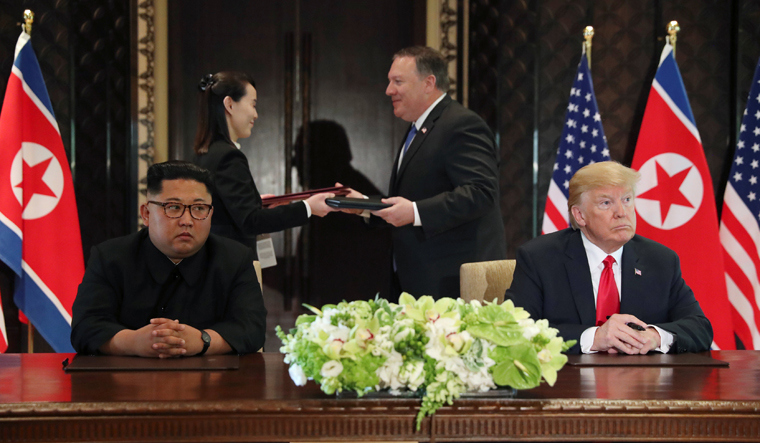US President Donald Trump has cited "an unusual and extraordinary threat" from North Korea's nuclear arsenal to extend sanctions on Kim Jong-un's regime, despite touting the success of a historic summit earlier this month.
After flying back to Washington last week, boasting of success, Trump had tweeted, "There is no longer a Nuclear Threat from North Korea." "Sleep well tonight!" he added on June 13, a day after the Singapore meeting.
But a presidential declaration sent to Congress on Friday struck a different note as it explained why the administration would keep in place tough economic restrictions first imposed by former president George W. Bush.
"The existence and risk of proliferation of weapons-usable fissile material on the Korean Peninsula and the actions and policies of the government of North Korea continue to pose an unusual and extraordinary threat to the national security, foreign policy, and economy of the United States," it said.
"I am continuing for one year the national emergency with respect to North Korea," added the statement on Friday.
Though the notice is considered pro forma, the disparity in tone reflects the work that US officials concede remains to be done as negotiators thrash out the details of Pyongyang's disarmament.
At their summit, Kim and Trump signed a pledge "to work towards complete denuclearisation of the Korean Peninsula," a stock phrase favoured by Pyongyang that stopped short of long-standing US demands for North Korea to give up its atomic arsenal in a "verifiable" and "irreversible" way.
Critics have pointed to the vague wording of the non-binding summit document and raised fears that the summit could weaken the international coalition against the North's nuclear programme.
However, the Trump administration appears to be continuing to work on confidence-building measures in the Korea Peninsula as the US and South Korea announced on Friday they had agreed to indefinitely suspend two military exchange programmes. This includes the Freedom Guardian exercise and marine training initiatives.

